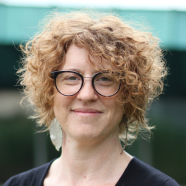
Lisa Genzel studied Medicine at the Ludwig Maximilian University in Munich, Germany. In parallel she performed her MD thesis on sleep related memory consolidation in healthy humans at the Max Planck Institute of Psychiatry under Prof Axel Steiger. One key finding of her thesis was that neither deep NonREM nor REM sleep were necessary for sleep related memory consolidation. Further, she provided the first evidence that there is a sex and menstrual cycle effect on the same.
She then first did a short post-doc working with patients with Schizophrenia and Depression at the Max Planck Institute. She could show that decreased hippocampal-medial prefrontal cortex connectivity was associated to deficiencies in sleep related memory consolidation in these patients. For this work she received the Young Investigator Award of the German Sleep Research foundation.
Next, Lisa moved to Edinburgh to switch to rodent methods and worked in the lab of Prof. Richard Morris investigating effects of previous knowledge, sleep and novelty on memory.
She became a Branco Weiss Fellow in 2014 and moved to the Donders Institute at Radboud University in 2017, where she took up an Assistant Professor position and started her own lab, combining the methods and working with mice, rats and humans. In her lab she investigates semantic memories and how sleep, novelty and disease can influence memory consolidation. To enable her research, she develops novel behavioral paradigms for rodents. She received the prestigious Dutch VIDI starting grant in 2018 and was promoted to Associate Professor in 2021.
In my lab, we want to understand how one goes from memories of individual experiences to extracting the knowledge used in our daily lives. For this we develop new complex, semantic-like memory paradigms in rodents that are more similar to human, complex cognition (e.g. the Object Space Task that can test for semantic-like, cumulative memories and the HexMaze, a large [9mX5m] maze used to test previous knowledge, schema and map learning effects).
These new paradigms are combined with electrophysiology and immediate early gene expression techniques in rodents to investigate detailed mechanism but we also create human &rodent analogue experiments to facilitate the translational approach.
With these methods we tackle big questions in memory with a cell to systems approach, such as why we need a dual system with a fast-learning hippocampus and slow-learning cortex (Navarro-Lobato et al BioRxiv 2022), and if semantic memories are simply many episodic memories (in short, they are not, Samanta et al in prep).
Further, with these new tasks the lab is creating large, systematic data-sets, which use the same basic design but different manipulations and which are shared openly. These systematic data-sets allow the verification of results with between-project replication as well as facilitate big-data-driven discovery.
One key insight, emerging from the lab’s work on semantic memories, is that much of what we think we know about memory does not apply to knowledge structures. For example, the hippocampus plays a much smaller role than expected in both long-term memory as well as spatial memory per se.